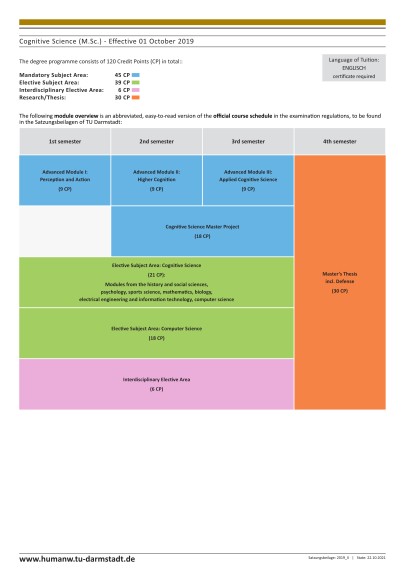Cognitive Science
Master of Science; tuition language: English
The following English language content is for information purposes only. The legally binding content can be found on the corresponding German website.
Description
The central tenet of Cognitive Science is that the human mind is essentially an information processing system. In order to understand human thinking, cognitive scientists try to to understand the various ways that minds process information to produce intelligent behavior. In order to build models of human cognition they carefully describe human behavior using methods from experimental psychology but they also use tools from computer science to formally describe the underlying information processing. Cognitive psychology and artificial intelligence form the core of the Cognitive Science curriculum at Technical University of Darmstadt.
Module Handbook (opens in new tab)
Study Regulations with Semester Course and Examination Schedule
| Semesters | 4 |
| Language | English. Individual courses/modules can be offered in German. Please be aware that scientific literature very often must also be read and edited in German. |
| Start of studies | Winter semester recommended; start of studies in a summer semester possible without study guarantee |
| Internship | internships within the study programme (see semester course schedule) |
| Admission requirements |
1. A degree B.Sc. Cognitive Science of TU Darmstadt (reference programme) or an equivalent degree; 2. submission of an official certificate of academic achievement with at least 110 CP with average score. 3. English at C1 (GER) level; required documents 4. additional requirements: Study regulations Competences description Admission requires competencies of at least 80 CP of the reference programme (B.Sc. Cognitive Science at Technical University of Darmstadt) in the areas of basic computer science (at least 30 CP), foundations of cognitive science (psychology, movement science, cognitive science, neuroscience, or related disciplines) (at least 30 CP) and advanced courses in cognitive science: linguistics, philosophy, sports science, psychology (at least 20 CP). |
| Admission procedure | Provided that the admission requirements (entrance examination) are met, there are no numerical admission restrictions. |
| Application |
Application portal and application deadlines How and when to provide the certification of the bachelor's degree Formal and language requirements for applicants with international qualifications |
| Good to know |
Costs and budget Preparatory courses for international students Pre-Courses, orientation week, getting started Part-time studies Doctoral Studies TU Darmstadt Career Service Alumni careers |


